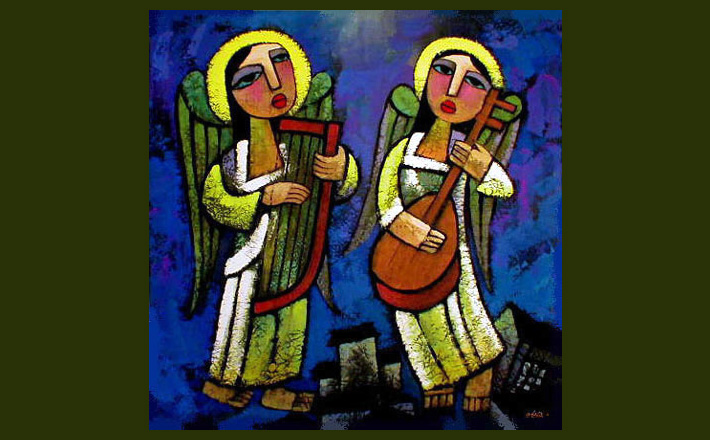Commentary on 1 Kings 8:22-23, 41-43
The lectionary reading of this week forms part of a very long section in 1 Kings 8 that comprises Solomon’s dedicatory prayer in the newly constructed temple.
As only a few verses are chosen from this chapter and hence one really only gets a snippet view of the prayer as a whole, it also may be quite interesting to see what is left out in order to get a better sense of the context in which the lectionary selection appears.
The first text suggested by the lectionary is 1 Kings 8:22-23 in which Solomon, before all of Israel stretches out his hands in prayer addressing God with the words: “There is no God like you in heaven above or on earth beneath.” Within this short introduction, one finds important elements that reflect Israel’s faith. God is One. There is no other God like the God of Israel. God in God’s steadfast love has made a covenant with Israel and expects of the people to be faithful to this One, Incomparable God.
This introduction is followed by a second brief excerpt from Solomon’s prayer. But before turning to these verses in 1 Kings 8:41-43 that really forms the heart of this week’s lectionary reading, one should take cognisance also of what lies in between these two texts. In the almost 20 verses left out, there is a lot of praying (cf. the repeated reference of the verb “to pray” and the noun “prayer”), crying and pleading to God, asking God to hear and to heed the prayers of the believers, as well as to forgive their sins.
Particularly the notion of God’s forgiveness that emerges as an important theme in 1 Kings 8 has to do with the deep-seated belief in Israel that if things are not going well, this is a sign of God’s anger and discontent with regard to Israel’s actions. If one reads carefully, just prior to the second lectionary selection from 1 Kings 8, it is quite evident that things are not well. In v 35 there is reference to a terrible drought with the heavens being shut up that causes tremendous suffering for humans and animals alike. And in v 37, there is mention of famine and of all kinds of pestilences (blight, mildew, locusts, caterpillars) that threaten the crops and hence the food supply in addition to other devastating events such as an enemy attack or an outbreak of plague or disease.
Reading between the lines, this dedicatory prayer of Solomon thus emerges out of a context of pain and suffering. The prayer reveals the believer’s struggle that is trying to make sense of the many unfortunate and even tragic events that all too often broke into the lives of Israel many centuries ago, as it continues to happen also in our time.
It is in this context of struggling to respond religiously to difficult times that one finds the very interesting text that forms part of this week’s lectionary reading. In 1 Kings 8:41-43, it is said that foreigners who have heard from the God of Israel will travel to Israel. There they will pray to God and God will listen to them. This text calls to mind the story of Naaman whose story is told in 2 Kings 5 and who indeed travelled to Elisha in order to be healed from leprosy. Naaman is an example of a foreigner who amidst experience of misfortune turned to God for help.
But this text also has broader interpretative possibilities. The surprising thing about 1 Kings 8:41-43 is that it forms such a sharp contrast to the way foreigners often have been viewed in many communities. In many communities then and now, if tragedy strikes, it must be someone’s fault. History is full of examples of women (as in the witch hunts), gays and lesbians, and ethnic and racial others, who all to some extent can be classified as foreigners, who are blamed for whatever misfortune has befallen the community. Such convictions that often are rooted in deeply ingrained emotions of hatred, fear, and disgust that have the effect of making these individuals quite vulnerable to violence as the community’s anger is directed to the foreigner who is to be expelled from the community in order for peace and prosperity to be restored.
But in 1 Kings 8, it is significant that vv 41-43 speak quite positively about the foreigners who are not to be scapegoated, even in a context of misfortune that precedes this pericope, but rather are elevated and even venerated. The foreigner is said to act as an intercessionary, praying to God with God heeding and hearing his/her voice.
It is significant to note that King Solomon emerges as a wise leader in this text who in his dedicatory prayer frames the presence of the foreigner in our midst in a positive fashion, recognizing their gifts and focusing on the value that these individuals bring to the community. To preach on such a text is especially meaningful in today’s context of the immigrant crisis in Europe as well as anti-immigrant sentiments around the world according to which numerous leaders have been shown to engage in an exclusionary rhetoric verging on violence that all too easily may give way to real violence.
However, of course things are always more complicated. In terms of a postcolonial reading, this text also could be viewed in terms of a hermeneutic of suspicion when Solomon’s prayer and the claim that foreigners will stream to Israel’s God in order to worship the one true God, could also be seen as an expression of the Deuteronomistic tradition that propagated a belief of superiority of Israel and as a result also its God. Even though it is important to understand this ideology as coming from the Deuteronomistic historian who is likely is responding to the crisis of the exile, to uncritically apply such a belief is dangerous in today’s context if employed as a tool of domination, forcing all others into submission.


May 29, 2016